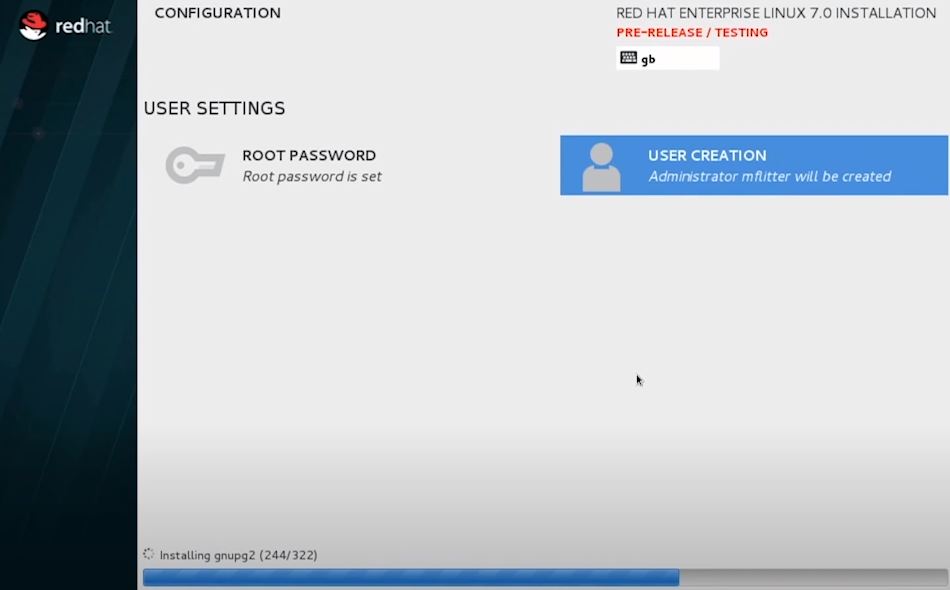Red Hat Enterprise Linux
About Red Hat Enterprise Linux
Red Hat Enterprise Linux Pricing
Red Hat Enterprise Linux's pricing starts at $99 for Red Hat Enterprise Linux Developer Suite and scales with the type of subscription, add-ons, variants and desktop options.
Starting price:
$99.00 per year
Free trial:
Not Available
Free version:
Not Available

Most Helpful Reviews for Red Hat Enterprise Linux
1 - 5 of 21 Reviews
Jonathan Alexander
Verified reviewer
Hospital & Health Care, 1,001-5,000 employees
Used daily for less than 2 years
OVERALL RATING:
5
EASE OF USE
5
VALUE FOR MONEY
4
CUSTOMER SUPPORT
5
FUNCTIONALITY
5
Reviewed July 2022
A secure, stable Linux distribution for robust and stable services
We currently use this distribution to manage interface services between LIS and clinical analysis equipment, which has been very useful since it is a stable system with good performance that knows how to take advantage of the assigned resources to manage tasks. secure, stable and above all manageable operating system
PROSWhat I like most about this distribution is how stable it can be once implemented. Also that it is very secure when it comes to data handling, vulnerability and unauthorized access, it is a distribution for server and business use
CONSThat it is a complex distribution as far as the user is concerned, it is not for users with little experience, but for advanced users of linux
Reason for choosing Red Hat Enterprise Linux
We needed a more stable distro that can balance the hardware resources allocated in a more efficient way.
Anonymous
10,000+ employees
Used daily for more than 2 years
OVERALL RATING:
5
EASE OF USE
5
VALUE FOR MONEY
5
CUSTOMER SUPPORT
5
FUNCTIONALITY
5
Reviewed June 2022
Best Linux for Enterprise applications
It's easy to use and you will get every possible support. Overall the best OS for application development.
PROSThe support from the red hat enterprise is very good. The enterprise-level features offered by RED HAT ENTERPRISE LINUX makes it one of the best candidate for enterprise applications. The memory management is quite well and it is almost compatible with every major enterprise-level software available in the market.
CONSThe GUI and support can be improved. Different official customizable GUI should be available. Official RHEL Desktop (GUI) container should be made available.
Reason for choosing Red Hat Enterprise Linux
RHEL provides a dedicated support which helps you to configure and maintain the OS in the best way possible.
Kaveri
Information Technology and Services, 501-1,000 employees
Used weekly for less than 2 years
OVERALL RATING:
4
EASE OF USE
4
VALUE FOR MONEY
4
CUSTOMER SUPPORT
4
FUNCTIONALITY
5
Reviewed February 2024
Advanced version of OS
The OS is well-documented and supported, with a great user community.
PROSIt is a open Source OS. It is more stable than Windows. It's simple to install, write, and compile code in various languages.
CONSIdentifying the dependencies of certain packages and finding their dependencies could be simpler.
rahul
International Trade and Development, 501-1,000 employees
Used daily for less than 2 years
OVERALL RATING:
3
EASE OF USE
4
VALUE FOR MONEY
5
CUSTOMER SUPPORT
4
FUNCTIONALITY
5
Reviewed March 2023
Strong platform Oerating system
It's an open source, Kernel is good, This is safe and secure OS. OS installation is very easy also. Easy to understand, Services installation process are easy and commands are understandable also.
CONSI have been using this OS on server level since from long time. I have faced OS Stuck (Lack) issues many times. Faced the lacking issue same more time while uninstalling any Program or services.
Wassim
Computer Networking, 501-1,000 employees
Used daily for more than 2 years
OVERALL RATING:
4
EASE OF USE
3
VALUE FOR MONEY
4
CUSTOMER SUPPORT
4
FUNCTIONALITY
4
Reviewed August 2023
Redhat Enterprise Linux: A big name for Developing and Deploying Enterprise Servers
I realized very good performance when running client/server applications on top of RHEL using the Java platform. Even when the communication is secured using SSL/TLS, the concurrency support was really impressive compared to other Linux distributions such as Kali and Ubuntu.
PROSI used Redhat Enterprise Linux for developing and deploying custom client/server applications using the Java Socket API. The main motive behind this development is to test the performance of SSL Sockets compared to normal Sockets using the Java Server Socket Extension API. We deployed the client and Server code on separtate Linux VMs and we managed the virtualization using the Vmware VSphere virtualization server. We realized a very good server concurrency of the JVM on RHEL compared to Kali and Ubuntu. This is the main advantange we depicted in RHEL that made it a very suitable enterprise platform for server-side code. The plan is to test with other programming languages for developing the server code such as in Python and C++ to see if we can generalize the performance enhancement compared to other Linux platforms.
CONSRHEL is a bit laggy when loading a GUI desktop environment. Although this is not the duty of an Enterprise Server environment to provide sophisticated desktop services, we believe that this could enhance the user experience during the development and deployment phases of the enterprise application.
